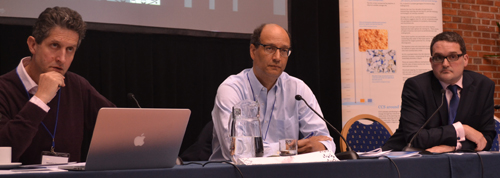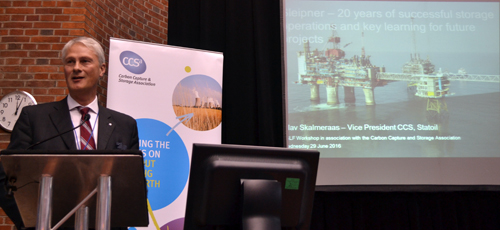

Conclusions from Workshop:
Summary Report (pdf 606 KB)
Session 1: The Role of CCS Post-Paris
Chaired by Luke Warren (Chief Executive, CCSA)

What role for CCS following COP21?
Philippe Benoit, Head of Energy and Environmental Division, International Energy Agency
The global carbon budget, fossil fuels assets and the role of CCS (presentation not available)
Myles Allen, Leader, Climate Research Programme, University of Oxford
Keynote Address

Sleipner – 20 years of successful storage operations and key learning for future projects
Olav Skalmeraas, Vice President – CCS, Statoil
Session 2: Preparing for Deployment
Chaired by Brian Allison (Department of Energy and Climate Change, United Kingdom)

A global perspective of the geological CO2 storage resource potential
Andrew Purvis, General Manager EMEA, Global CCS Institute
Conclusions of the U.K. Storage Appraisal Programme
Den Gammer, Programme Manager CCS, Energy Technologies Institute
Carbon Capture Readiness: Experience in implementing capture readiness in the E.U. and beyond
Maria Velkova, Policy Officer – Low Carbon Technologies and Measures, DG Climate Action, European Commission
Neal Mehta, Managing Consultant, ICF International
Emrah Durusut, Principal Consultant, Element Energy
Session 3: Hubs, Clusters and Sharing Infrastructure
Chaired by Kirsty Anderson (Principal Manager – Public Engagement, Global CCS Institute)

Introductory Remarks – The North Sea Basin Task Force: Catalysing “Europe’s Silicon Valley”
Stig Svenningsen, Ministry of Petroleum and Energy, Norway
The ROAD Project: A step towards a Rotterdam hub
Andy Read, Director, ROAD
Teeside Collective, a new industrial future for the U.K.
Sarah Tennison, Low Carbon Manager, Tees Valley Combined Authority
Scotland’s climate change targets and CCS opportunities (no presentation)
Christopher Bryceland, Scottish Enterprise
Session 4: Fresh Perspectives on CCS
Chaired by Graeme Sweeney (Chair, Zero Emission Platform)

Lessons Learned from U.K. CCS Programme, 2008-2015
Theo Mitchell, Policy Manager, CCSA
The case for a ‘market maker’ and a business model for CO2 storage
Owain Tucker, Co-Chair, Zero Emissions Platform Working Group on Transport and Storage; Global Deployment Lead – CCS and CCUS, Shell
Beyond pipelines: The case for shipping CO2
John Kristian Økland, Project Manager, Gassco
The US-DOE/EERC Brine Extraction and Storage Test (BEST): Phase 1 lessons learned and Phase 2 plans
Edward Steadman, Vice President for Research, University of North Dakota’s Energy and Environmental Research Center
CCS, Heat and Hydrogen: Decarbonising the Leeds city-region (presentation not available)
Dan Sadler, Head of Investment Planning and Major Projects, Northern Gas Networks
Session 5: What can the CSLF do? (Summary and next steps)

Concluding remarks (no presentations)
Jarad Daniels, United States, Chair, CSLF Policy Group
Åse Slagtern, Norway, Chair, CSLF Technical Group
Luke Warren, Chief Executive, CCSA
